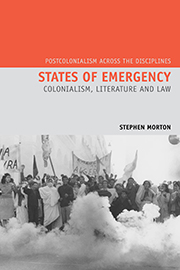1 - Sovereignty, Sacrifice and States of Emergency in Colonial Ireland
from Part I
Summary
In an article published in March 1870, Jenny Marx-Longuet, daughter of the author of The Communist Manifesto, declared that ‘Theoretical fiction has it that constitutional liberty is the rule and its suspension an exception, but the whole history of English rule in Ireland shows that a state of emergency is the rule and that the application of the constitution is the exception.’ Writing in response to the Gladstone government's ‘Peace Preservation (Ireland) Act’ of 1870, Marx-Longuet highlights a contradiction in the colonial policy of British sovereignty towards a country that was legally part of the United Kingdom between 1800 and 1922. Such a contradiction is exemplified in the tension between the rhetoric and practice of liberal colonial governmentality in nineteenth-century Ireland. As the historian Charles Townshend explains, the British Prime Minister William Gladstone was uncomfortable with the recourse to coercive measures that went against the grain of the Liberal government's political principles, and ‘fumed that the “resources of civilization had not yet been exhausted” in the battle against agrarian violence’. And yet the very ‘resources’ that Gladstone invoked ‘were nothing more than military force and repressive laws denounced in England as unconstitutional’.
- Type
- Chapter
- Information
- States of EmergencyColonialism, Literature and Law, pp. 35 - 60Publisher: Liverpool University PressPrint publication year: 2013

